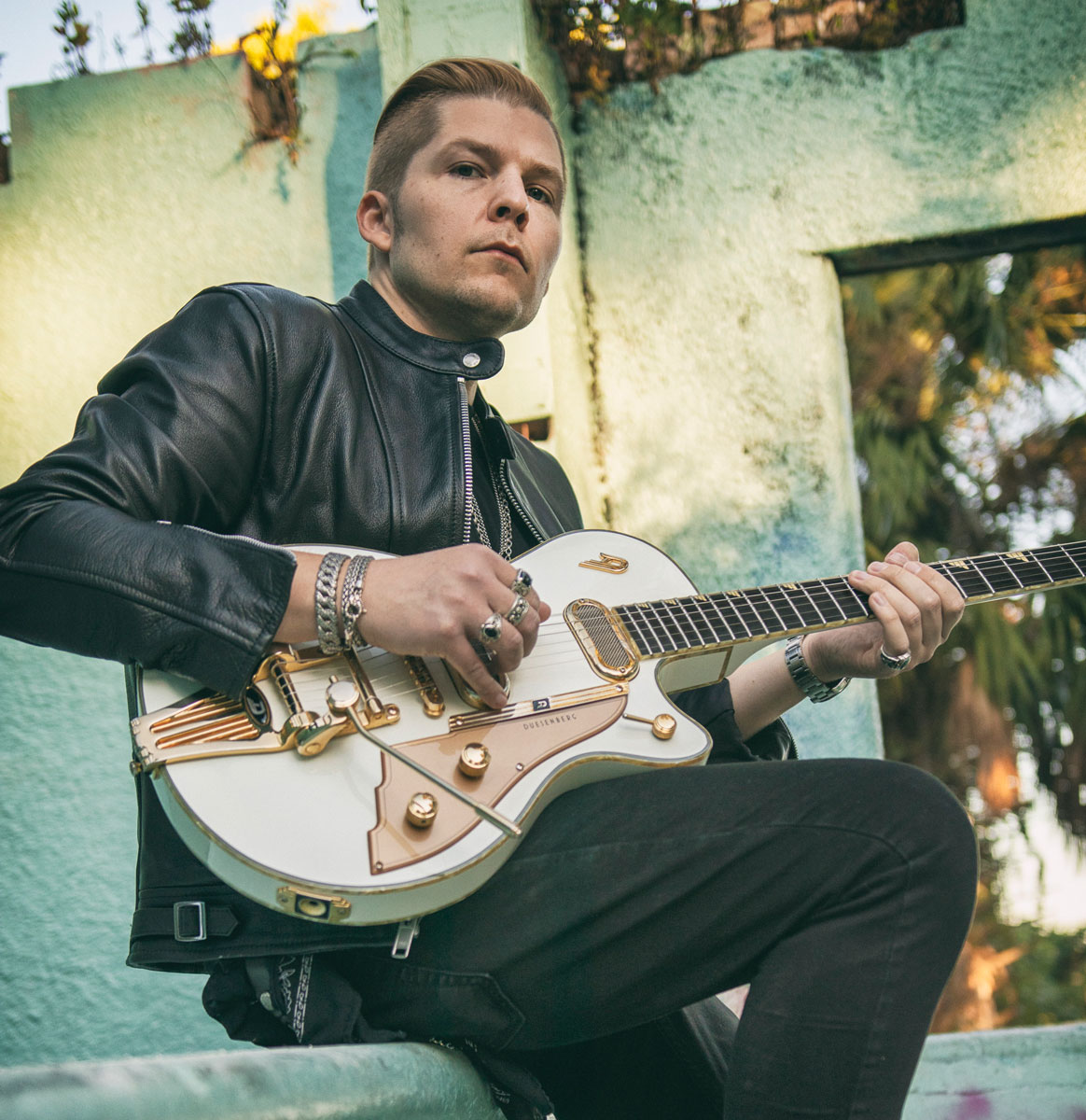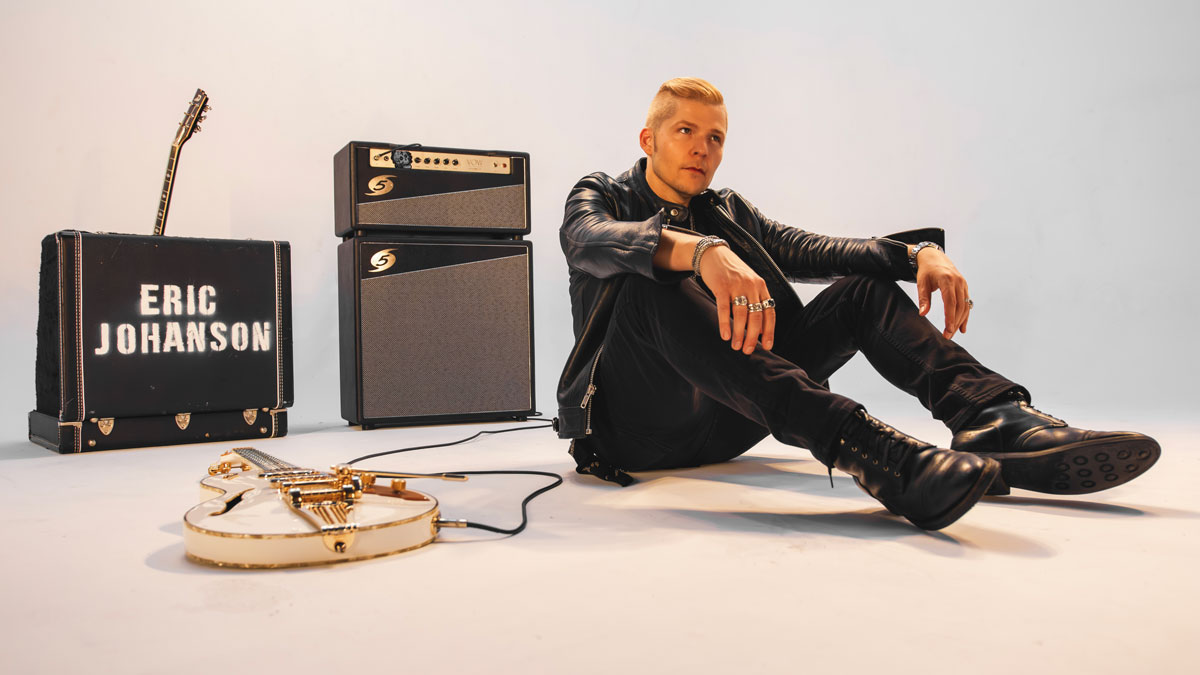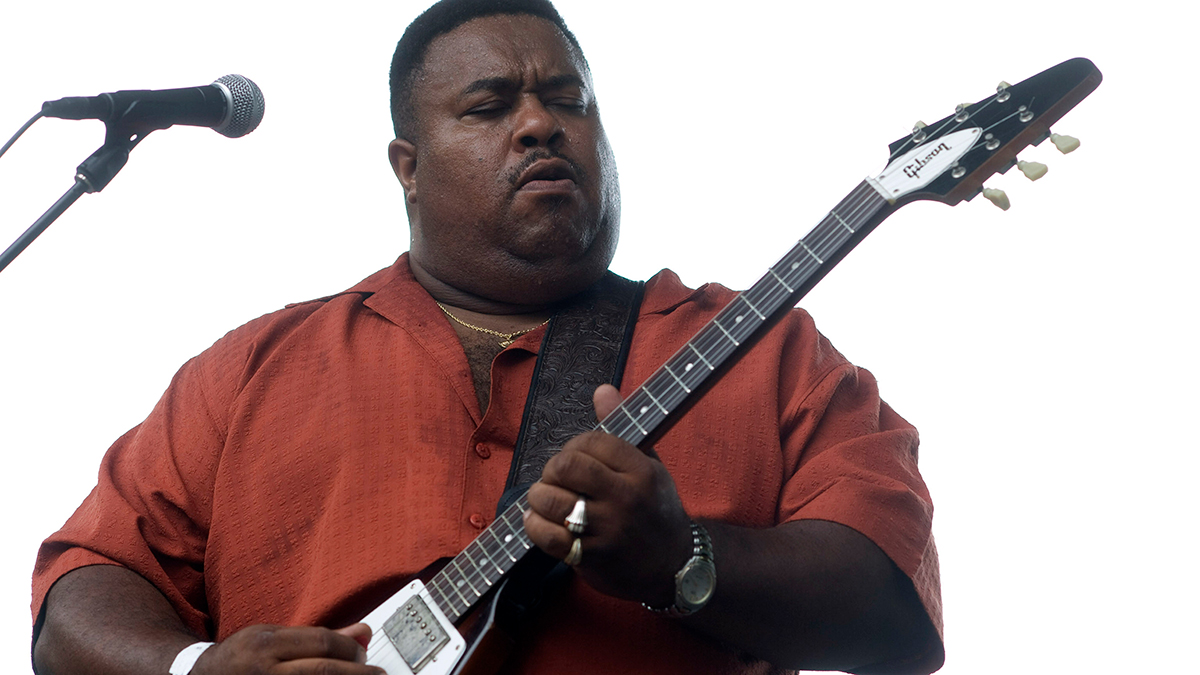"I grew up listening to Megadeth, Metallica and White Zombie. A good riff will always grab my attention": How metal-raised blues dynamo Eric Johanson is taking a heavy approach to a classic genre
The Louisiana gunslinger on why stacking overdrive pedals is the key to great sustain, what he learned from working with Jesse Dayton and how being present opens him up as a guitarist

Hailing from Louisiana, the same swampy state that the likes of Lead Belly, Clifton Chenier, and Buddy Guy once called home, it's easy to see why Eric Johanson was smitten with the blues from a young age.
But anyone who has feasted their ears on Johanson's music knows that if you dig deeper, there are underpinnings of heavy riffs and charismatic chord changes. To that end, Johanson tells Guitar World, "I grew up listening to Megadeth, Metallica and White Zombie. And to this day, a good riff will always grab my attention."
"But the music I make would probably be considered a far cry from that," Johanson laughs. "Riff-driven rock is what grabbed me as a kid, and it's what made me want to play guitar. I remember being young and learning to play rhythm guitar, and I wanted to be just like James Hetfield."
"His style, combined with the fact that he could do it while singing, inspired me," the guitarist says. "And while I don't play like James, I still work on that. That, along with incorporating powerful riffs, is the best example of that music being present in what I do today. It's still there, but maybe it's not so apparent."
Johanson's latest studio offering, The Deep and the Dirty, is his most raucous in years. After a few efforts that leaned more mid-tempo, the always expressive blues rocker cranked his amps to 10, pumping the volume to match his good-time live shows.
"I love being out on the road," Johanson tells us. "I can't wait to roll out these songs for my upcoming shows. I like giving the fans the type of show I'd want to see. I want things to be fun. My last few records meant a lot to me, but a lot of the songs didn't fit the high-energy mold of the lives shows I often do. So, I can't wait to see how some of these new songs fit into the set."
As frenzied as he may be on stage, at his core, Johanson is a thinking man's guitarist. Ever introspective while wading through intense periods of self-reflection, Johanson has once again come out the other side, using the aptly named The Deep and the Dirty as a conduit to express his inner musings.
All the latest guitar news, interviews, lessons, reviews, deals and more, direct to your inbox!
"Identifying what's going on inside of me is a huge part of my writing style," Johanson admits. "That's from both a song standpoint and how I approach the guitar. I'm always working on how I think about things, which manifests as attempts to put my existential wandering into songs. It's a lot of reflection and grasping for greater meaning through analyzing the ups, downs, and all that goes along with that."
In support of his latest record, Eric Johanson dialed in with Guitar World to dig into his in-studio approach to recording, the challenges faced in overcoming his inner monologue, and stacking drive pedals is one of his top tone tips.
What are the origins of The Deep and the Dirty?
"My manager and I were kicking around different ideas for producers but hadn't decided yet. And then he suggested Jesse Dayton, who is a guitarist and producer because he'd been working with Jesse of late, too. And having Jesse be a part of it gave the record a different spin because he added in a lot of flavors I wouldn't normally add myself. As soon as Jesse heard my demos, he and I got kicking right away. He had a good bead on what I wanted to do, and I dug the things he was throwing back at me."
Did having Jesse aboard alter your in-studio approach?
"In some ways, yes. Once we dialed in what songs we wanted to include, we played each live around five times. And through that process, we figured out what worked and what didn't. So, by the time we were ready to record, I had all this live experience to draw from. And I think that figuring out what effects and what not worked best for each song helped shape the album. But even when we recorded the songs, we did them live in the studio, which is my preferred way to go about it. So, that didn't change."
Do you run the risk of overthinking when you undertake that level of preparation?
"That's a good question. I guess, to me, if I've got something that I've been working on for a while, it's important for me to let go at some point, you know? Because the constant train of thought that can sometimes be running through your head can definitely lead to overthinking. So, it is important to let go, whether through meditation or just recognizing that the thoughts constantly going on in your head don't have to be on that ride constantly."

I assume letting go further opens you up creatively from a guitar perspective.
"It does. Letting go can lead to new ideas entering the picture or even replacing things you were thinking about. It's good to be present and live with primary awareness of the moment that you're in rather than getting caught up, worrying about the future, or fretting about the past. The last part is something that I work on personally. I've kind of gotten there, but I still have a constant battle with my internal dialogue. But being present definitely opens me up as a guitarist."
How so?
"It's like me saying, 'If I do this or I do that, I can change my situation. And if I do that, it'll change how I feel about this song or that part.' But that same internal narrative that I have going on in my head can hold me back from being the best I can be. It can even hold me back from enjoying life. And if that's the case, you have to take a step back and change more than just the immediate surroundings. Maybe it's also the people around you, or maybe it's a deep dive into your thinking."
Which cuts from The Deep and the Dirty proved to be the most challenging to record?
"That's a question I've been dreading because I don't have a good answer for it. I mean… I can answer it, but what I mean is I don't have a specific song in mind. And the reason for that is I've been trying to get away from painting myself into a corner with guitar parts. There was a time when I would come up with a guitar part, record it, and then think about what I wanted to sing over it. But I'd have no regard for the fact that I had to learn it later.
"So, another change for me in recent years is that I try only to write when I've got a guitar in my hands. That way, the song organically arrives at a place where the singing and playing work together. If you want to express yourself live while playing the song, you don't want to feel like you're trying to juggle two things. So, I've tried to keep the songs very performable. But to do that, I had to make them very recordable."
Your guitar sounds have a vintage amp tone to them. Was that the case?
I've found that you can have consistent results in different environments at different volume levels by using a couple of overdrives
"It was! The basic sounds you hear on this record is my rig going through a few different amps. But the main one was a '66 Fender Deluxe Reverb, which has been re-housed in a cabinet configuration. And then there was an Orange amp that was at the studio that we ran separately with a completely clean tone just to see if it added something. But it's not that prominent in the sound, and is really only featured lower in the mix at different times."
The Deluxe Reverb is a great pedal platform. Any notable additions to your 'board?
"I try all different ones all the time. I tend to stack overdrive pedals to find some sustain without oversaturation. But there are also times when I just plug directly into the amp and record with no pedals, too. I do that in the moments when I feel like my notes and bass response are losing their attack due to fuzzing out.
"But when I do use pedals, I've found that you can have consistent results in different environments at different volume levels by using a couple of overdrives. I tend to gravitate toward drives that are both natural and transparent. I know those are overused terms, but it's the best way I can think to describe my want to keep the attack and dynamics of everything getting squashed."

And which guitar or guitars played the most significant role?
"I have two Duesenberg Starplayer guitars. One is a white TV Phonic, and the other is a back TV Deluxe. So, those were essentially the two main electric guitars I used.
"And then, I have a couple of PRS Custom 22s that have been with me for some time. I don't really bring them on the road much because I've grown into other guitars. But I still used them on this record. I tuned one of them to open D and used it on a bunch of electric slide stuff. You can hear an example of that on Elysian Fields from the new record."
Your slide work on Borrowed Time is outstanding.
I'm very proud of my slide work on this record. It's a big reason why I used several guitars. I wanted to be able to have the ability to experiment with different tunings
"Thanks! That one was actually done with the Duesenberg, and I used standard tuning. I'm very proud of my slide work on this record. It's a big reason why I used several guitars. I wanted to be able to have the ability to experiment with different tunings and whatnot. But that aside, the other guitar I used was a steel body guitar by National. It looks chrome, but I always forget if it's made of brass or steel."
Perhaps more so than your previous records, The Deep and the Dirty represents the player you are today. Where do you go from here?
"I think you're right about that. As far as where I go from here, well… I'm looking forward to playing these songs live. This is a high-energy record, and I'm looking forward to doing high-energy shows. For whatever reason, my previous couple of records ended up being more mid-tempo. So, when I'd go out live, the shows were, too. But with this record, there's some cool stuff that I'm looking forward to being able to play with the band. There are a lot more textures going on and more modal things happening in certain areas."
Complex as it is, it's still profoundly bluesy...
"Oh, don't get me wrong, it's still bluesy, but there are a few more chord changes than some of my previous stuff. I'm looking forward to painting my live canvas with these songs. And I'm looking forward to how me and my band will approach them live because things constantly change once you get out there. Live performance is about creating a singular act in the moment. It's not about reproducing something that you already did. I'm about what's right now and can't wait to experience truly improvisational moments."
- The Deep and the Dirty is out on July 28 via Ruf Records.
Andrew Daly is an iced-coffee-addicted, oddball Telecaster-playing, alfredo pasta-loving journalist from Long Island, NY, who, in addition to being a contributing writer for Guitar World, scribes for Bass Player, Guitar Player, Guitarist, and MusicRadar. Andrew has interviewed favorites like Ace Frehley, Johnny Marr, Vito Bratta, Bruce Kulick, Joe Perry, Brad Whitford, Tom Morello, Rich Robinson, and Paul Stanley, while his all-time favorite (rhythm player), Keith Richards, continues to elude him.

